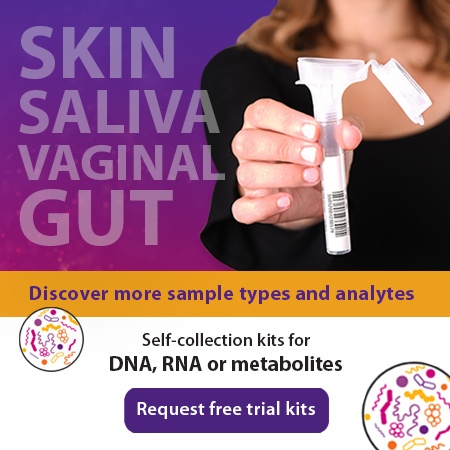2020-10-06
Today, the term “fecal microbiome” is widely used by dieticians, physicians, and microbiome companies to understand human disease and assess dietary intervention. The fecal microbiome has also sparked interest in the canine world. According to the Canadian Pet Wellness Report by the Canadian Veterinary Medical Association (CVMA), 35% of Canadian households have dogs: that’s 5.9 million dogs in Canada! [1] According to Washington Post, there are currently 90 million dogs in the US.[2]
Since dogs are popular household pets, canine health research has increased over the past few decades. Recently, researchers have looked towards the potential of studying the gut microbiome to predict and diagnosis diseases for canines. Like the study of the human fecal microbiome, the accuracy and reproducibility of the microbiome data depends on:
- Sample integrity
- Accuracy
- Reproducibility
...which can be affected by fecal sample storage methods.
To date, the “gold standard” of fecal collection has been to rapidly freeze and store samples at -80°C . I put the phrase, gold standard, in quotes because this method is not very practical in many cases making the choice of the word “gold” inaccurate. For example, freezing samples for storage might not always be feasible when collecting fecal samples from home or remote locations.
[See blog, Is there a new gold-standard for gut microbiome stool collection? for more information on cold-chain collection]
In August 2020, a paper titled “An Ambient Temperature Collection and Stabilization Strategy for Canine Microbiota Studies,” by Lin et al. tested the stability and quality of the canine fecal collection and stabilization device called PERFORMAbiome•GUT (PB-200) compared to unstabilized fecal samples. To date, there is limited information about canine fecal sample collection and storage methods, so Lin et al. (2020) set out to explore this concept.
The goal of this study was to evaluate the effectiveness of PERFORMAbiome•GUT in preserving fecal samples at different storage temperatures (which is meant to mimic shipment conditions where temperatures often change), as well as efficacy of long term storage (60 days) at room temperature.
Fecal samples were collected with the kit and stored at the following temperatures. Additional samples were put through 4 repeated freeze-thaw cycles (-20°C/30°C):
- Room temperature: ~23°C
- 37°C
- 50°C
The research team compared samples extracted same day of collection (baseline) to stabilized samples using PERFORMAbiome•GUT which were held for 1, 3, 14 or 60 days. Unstabilized samples were also collected and stored at room temperature for comparison.
To determine intra-sampling variation of the samples, they compared the samples collected from three locations of each fecal sample collected with PERFORMAbiome•GUT.
Stabilized vs unstabilized fecal samples
Microbiome profiles are largely unaffected by storage method at baseline
All baseline samples extracted on the collection day within 2 hours, including 3 stabilized samples using PERFORMAbiome•GUT and one unstabilized sample were compared. They found that relative abundance levels at the phylum level as well as alpha- diversity and beta-diversity were the same when all samples were compared.
Stabilized samples stored at high temperature yield consistent microbiota profiles that are similar to baseline samples
They found that alpha and beta diversity was not affected by samples collected with PERFORMAbiome•GUT at varying temperatures of 37°C and 50°C when stored for 1 to 3 days (ideal time it takes to ship samples) compared to baseline samples (samples collected and immediately extracted).
Microbiota profile of stabilized samples is largely unaffected by 4 freeze-thaw cycles.
When stabilized samples using PERFORMAbiome•GUT underwent the freeze-thaw cycle test, (-20°C/30°C) they were found to be largely unaffected when compared to baseline samples, indicating that PERFORMAbiome•GUT can withstand multiple freeze-thaw cycles during storage or shipping.
Stabilized samples yield consistent microbiota profiles, while unstabilized samples result in substantial changes in microbiota profiles when stored at room temperature.
Samples collected using PERFORMAbiome•GUT were stored at room temperature (~23°C) for 14 and 60 days. Unstabilized samples were also stored at room temperature for 14 days. When compared to baseline samples, there was a higher species richness observed in unstabilized samples stored for 14 days than in stabilized samples, as well as a shift in beta diversity for unstabilized samples. Stabilized samples using PERFORMAbiome•GUT had relatively small changes when stored at room temperature for 14 and 60 days.
Microbial composition varies among collection sites within a fresh fecal sample
To evaluate the intra-sampling variation with fresh fecal samples, they compared aliquots collected from both ends and from the middle of the fresh samples. They found that the relative abundance at phylum level was very different among different collection sites of the collected fresh sample.
When collecting using PERFORMAbiome•GUT the samples from all collection sites remain homogenous due to the built-in structure of the collection device which includes a metal ball designed to homogenize and thoroughly mix the sample as part of the collection procedure. This ensure the taking multiple aliquots from the same sample will be undisguisable and reproducible.
The “gold” standard of rapid freezing and storage of fecal samples is often challenging and costly, which limits the ability of collection at remote sites or collection of large sample numbers. Ambient temperature collection and stabilization is an ideal method for microbiome studies and based on the work of Lin et al. PERFORMAbiome•GUT for canine fecal collection provide sample integrity, accuracy, and reproducibility.
If you are interested to learn more about PERFORMAbiome, you can email us at info@dnagenotek.com or click the banner below to request trial kits for your study.
Related Blogs:
Canine gut microbiome – An interview with Dr. Kelly Swanson
Cold chain stool sample collection: a series of unfortunate events (Part 1/3)
References:
[1] https://www.canadianveterinarians.net/documents/canada-s-pet-wellness-report2011#:~:text=The%20subject%20of%20pet%20wellness,(source%3A%20Ipsos%20Reid).
[2] https://www.washingtonpost.com/science/2019/01/31/how-many-americans-have-pets-an-investigation-into-fuzzy-statistics/



